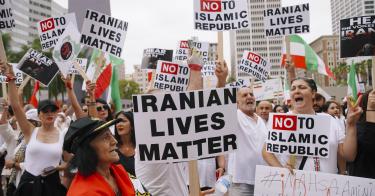The killing of Mahsa Amini may represent a watershed moment in U.S. policy toward the Islamic Republic of Iran.
A pair of TIPP polls taken in July and October reveal a startling shift in American’s views of re-entering the Joint Comprehensive Plan of Action, or Iran nuclear deal, as a national security priority. In July a majority supported prioritizing the deal. By October a large plurality favored human rights over the JCPOA.
In the summer poll, 55% of respondents agreed that reentering the Iran nuclear deal should be a Biden administration priority, while only 24% said no. The data did, however, reveal a partisan divide: 70% of Democrats agreed strongly or somewhat, while just 45% of Republicans and 46% of Independents did so.

On the potential efficacy of a new deal, 51% of respondents thought it could prevent Tehran from getting a nuclear weapon, while 26% believed it could not. Here, too, the numbers diverged along party lines, with 68% of Democrats expressing some degree of confidence the deal could work, versus only 42% of Republicans and 41% of Independents.
>>> Heritage Explains: Major Protests in Iran
Finally, on the question of whether the Biden administration should lift sanctions on Iranian oil exports to ease gas prices here at home, 49% of Americans agreed with doing so, while 31% disagreed. On this issue, the partisan gap narrowed, with 57% of Democrats, 45% of Republicans and 44% of Independents agreeing, indicating broad anxiety over high energy prices.
In October, however, opinions on the JCPOA as a national security priority had shifted dramatically, apparently due to the murder of Mahsa Amini and the subsequent popular protests in Iran. The brutal beating death of a young Kurdish visitor to Tehran at the hands of the “Morality Police,” who disapproved of the fit of her hijab, touched a nerve in the country but also captured the world’s attention.
In a significant reversal, respondents prioritized “[s]upporting Iranians protesting for women’s rights” over “[r]e-entering the nuclear deal with Iran” by a margin of 44% to 24%, with 50% of Democrats, 40% of Republicans and 43% of Independents responding in the affirmative. The shift among Democrats is particularly significant given their overwhelming support for re-entering the JCPOA just three months earlier. It may also explain why the Biden administration has adopted more forward-leaning rhetoric supporting the protesters.

The TIPP poll also asked two questions about the Department of State granting visas allowing foreign leaders of sanctioned countries to visit the United States to attend the United Nations General Assembly in September. In general, such visas are granted as a matter of diplomatic protocol with everyone from Yasser Arafat to Hugo Chavez receiving one. State does have the authority, however, to deny them if the applicant has engaged in espionage, a statute that was updated to include terrorism in 2015—which was used to deny then Iranian Foreign Minister Javid Zarif a visa to visit the UN in January 2020. This year, Iranian President Ibrahim Raisi was granted a visa. He used his time at the General Assembly podium to rail against countries such as the United States and Canada for their human rights records, while the Iranian security apparatus was brutally suppressing Amini-related protests. Russian Foreign Minister Sergei Lavrov was also granted a visa even as his country’s military continued the griding carnage in Ukraine.
>>> Iranian Drones Head to Russia for Use Against Ukraine
Asked if these visas should have been granted, 39% of respondents disagreed with the decision to give one to Raisi while 31% agreed and 30% were not sure. Again, there was a clear partisan divide with 51% of Republicans and 47% of Independents disagreeing, compared to only 27% of Democrats. Nearly half (49%) of Democrats agreed, compared to only 23% of Republicans and 17% of Independents.

Lavrov received a similar but slightly stronger response: 44% of respondents disagreed with the visa compared to 31% supporting it. The variation across party lines also held: 57% of Republicans and 46% of Independents disagreed, while only 33% of Democrats did. Democrats were more than twice as likely to support the Lavrov visa than were Republicans or Independents (47% v. 23% and 20% respectively). In both cases, about a third of respondents had no opinion, but for most there appears to be a general unease with granting leaders with such deplorable human rights records access to the United States.
Throughout both surveys, Independents’ responses tracked with Republicans’ much more closely than with Democrats’, suggesting a more general appeal for these positions, while not surprisingly Democrat opinions appeared more likely to reflect the Biden administration’s policies.
The outlier here is the issue of prioritizing re-entering the JCPOA. Given the stark reversal among Democrats for making it a top priority after the murder of Mahsa Amini, the Administration can expect little domestic support for any attempt to get a new deal after the mid-term elections in November, especially if the protests continue.
This piece originally appeared in 19fortyfive




